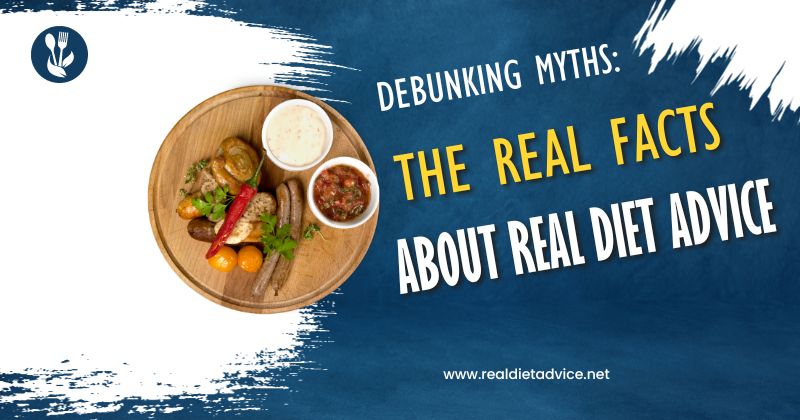Shattering myths surrounding real diet advice and shedding light on its potential benefits.
Weight loss, health improvement, and body transformation – these objectives motivate many people to seek advice on the right diet. From social media influencers to self-proclaimed health gurus, the internet is swarming with numerous diet suggestions, each promising extraordinary results. Yet, how many of these are genuinely effective, scientifically backed, and safe for your health? This article delves deep into some common misconceptions, revealing the real facts about real diet advice.
Real Facts About Real Diet Advice
Many diet myths and misconceptions are based on outdated research, lack of understanding, and misinterpretation of science. However, to separate the wheat from the chaff, we must turn to evidence-based, peer-reviewed research. Below we will debunk some common diet myths and replace them with real facts about real diet advice.

Myth 1: All Fats Are Bad
The notion that all fats are detrimental to health is outdated. In fact, our bodies need certain types of fats to function correctly. Here are some facts:
- Monounsaturated fats and polyunsaturated fats, such as those found in avocados, fish, nuts, and seeds, can decrease the risk of heart disease when used to replace saturated fat.
- Omega-3 fatty acids, found in fatty fish like salmon and trout, are particularly beneficial for heart health.
- Trans fats, however, are harmful and should be avoided as much as possible. They are often found in processed foods and baked goods.
Myth 2: Carbohydrates Make You Fat
While it’s true that consuming excessive calories from any source can lead to weight gain, it’s not specifically carbohydrates that are the issue.
- Whole grains, fruits, vegetables, and legumes are all sources of carbohydrates that are rich in fiber and essential nutrients.
- Processed carbohydrates, like white bread and sugar-sweetened drinks, can contribute to weight gain and health problems.
Myth 3: Gluten Is Bad for Everyone
Gluten, a protein found in wheat, barley, and rye, can cause health problems for people with certain conditions, such as celiac disease or gluten sensitivity. However, for the majority of people, gluten is not harmful.
| Conditions Requiring a Gluten-free Diet | Conditions Not Necessarily Requiring a Gluten-free Diet |
| Celiac disease | Irritable bowel syndrome (unless associated with gluten sensitivity) |
| Non-celiac gluten sensitivity | General health improvement efforts |
| Wheat allergy | Weight loss plans (unless prescribed by a health professional) |
Myth 4: All Calories Are Equal
Not all calories have the same effect on your body. Here are a few facts:
- Protein calories are less likely to be stored as fat because of the high thermic effect and satiety level of protein.
- Carbohydrate calories from whole foods like vegetables, fruits, and whole grains are nutrient-dense and promote overall health.
- Fat calories are the most energy-dense but can be beneficial for satiety when consumed in moderation.
The Truth Behind Real Diet Advice
Real diet advice focuses on a balanced, varied, and nutrient-dense diet. It should promote regular physical activity, adequate hydration, and a mindful approach to eating. Rather than endorsing extreme restrictions, the best dietary advice will advocate for sustainability and enjoyment in eating healthily.
It’s also crucial to remember that individual nutritional needs may vary depending on age, sex, physical activity level, and any underlying health conditions. Therefore, personalization is a key factor when considering real diet advice.
Key Takeaways
The real facts about real diet advice are rooted in evidence-based, scientific research, rather than trends and misconceptions. Here are the key points to remember:
- Not all fats are bad – Monounsaturated fats, polyunsaturated fats, and Omega-3s are beneficial for heart health.
- Carbs are not the enemy – Whole food sources of carbohydrates are rich in nutrients and fiber, promoting overall health.
- Gluten is not universally harmful – Only those with conditions like celiac disease, non-celiac gluten sensitivity, or wheat allergy need to avoid gluten.
- All calories are not created equal – The source of the calories matters as different types of food have various effects on satiety, energy usage, and nutrient absorption.
Applying the real facts about real diet advice requires discernment and understanding. Remember, it’s always best to consult with a registered dietitian or a healthcare professional before embarking on any significant dietary changes.
FAQ
1. Is it true that all fats are bad for your health?
Answer: No, the notion that all fats are bad for you is outdated. In fact, certain types of fats are essential for your body to function properly. Monounsaturated and polyunsaturated fats, found in foods like avocados, fish, nuts, and seeds, can actually benefit heart health. However, trans fats, commonly found in processed foods, should be avoided as they can be harmful.
2. Do carbohydrates make you gain weight?
Answer: Carbohydrates themselves are not the culprit for weight gain; rather, it’s the excessive caloric intake from any source that can lead to weight gain. Whole grains, fruits, vegetables, and legumes are sources of carbohydrates that are rich in fiber and essential nutrients. On the other hand, processed carbohydrates like white bread and sugary drinks can contribute to weight gain and other health issues.
3. Is gluten harmful to everyone?
Answer: No, gluten is not universally harmful. While it can cause health issues for individuals with conditions like celiac disease or gluten sensitivity, for the majority of people, gluten is not a problem. A gluten-free diet is necessary only for those with specific medical conditions that require it.
4. Are all calories created equal?
Answer: Not all calories have the same impact on your body. For example, protein calories are less likely to be stored as fat due to the high thermic effect and satiety level of protein. Carbohydrate calories from whole foods like fruits and vegetables are nutrient-dense and promote overall health. Fat calories are energy-dense but can be beneficial for satiety when consumed in moderation.
5. What is the key to real diet advice?
Answer: The key to real diet advice is focusing on a balanced, varied, and nutrient-dense diet that promotes regular physical activity, adequate hydration, and a mindful approach to eating. It’s also crucial to personalize your diet based on factors like age, sex, physical activity level, and any underlying health conditions. Consulting with a registered dietitian or healthcare professional is highly recommended before making significant dietary changes.
Conclusion
In conclusion, the article “Debunking Myths: The Real Facts About Real Diet Advice” serves as an invaluable resource for dispelling common misconceptions about diet and nutrition. It emphasizes the importance of evidence-based, scientific research as the cornerstone for making informed dietary choices. By tackling myths surrounding fats, carbohydrates, gluten, and calories, the article provides a nuanced understanding that challenges outdated beliefs and promotes a balanced, personalized approach to nutrition. The article also underscores the importance of consulting healthcare professionals for tailored advice, reminding us that one size does not fit all when it comes to diet. Overall, it’s a must-read for anyone seeking to navigate the often confusing landscape of diet advice, armed with facts rather than fads
Recommended Post For You
- Boost Your Health with These 7 Real Diet Advice Tips
- Master Your Meals: Real Diet Advice for Meal Planning
- Why ‘Real Diet Advice’ Isn’t As Scary As You Think!
- Stop Guessing: Get the Real Diet Advice You Deserve
- Understanding Macro-nutrients: A Comprehensive Guide to Fueling Your Body for Optimal Health
- Is Real Diet Advice a Game-Changer? Truth Revealed!
- Real Diet Advice: Transformative Tips Beyond the Hype
- Uncover the Secret of Real Diet Advice – The Ultimate Guide
Reference
- U.S. Department of Health and Human Services – Nutrition and Healthy Eating: This resource provides evidence-based methods to improve health and prevent disease, focusing on nutrition and healthy eating. Visit the website
- The Philosophy of Evidence-Based Principles and Practice in Nutrition – PMC – NCBI: This article discusses the fundamental principles of evidence-based nutrition and its importance in clinical decision-making. Read the article
- Perspective: The Evidence-Based Framework in Nutrition and Dietetics – PMC – NCBI: This research article focuses on the challenges and future directions of implementing an evidence-based framework in nutrition and dietetics. Read the article
- What is Evidence-Based Nutrition? – Trifecta: This blog post explains what evidence-based nutrition is and how dietary recommendations are made based on scientific evidence and clinical experience. Read the blog
- Office of Disease Prevention and Health Promotion: This is the coordinating office for the U.S. Department of Health and Human Services, providing various resources and guidelines related to disease prevention and health promotion, including nutrition. Visit the website
